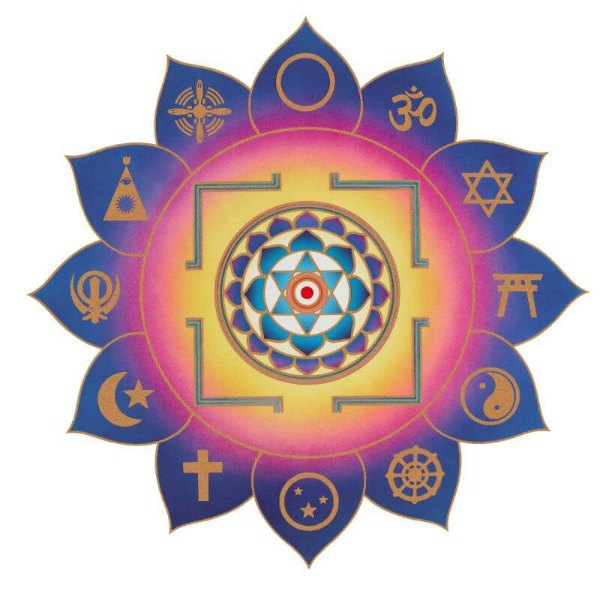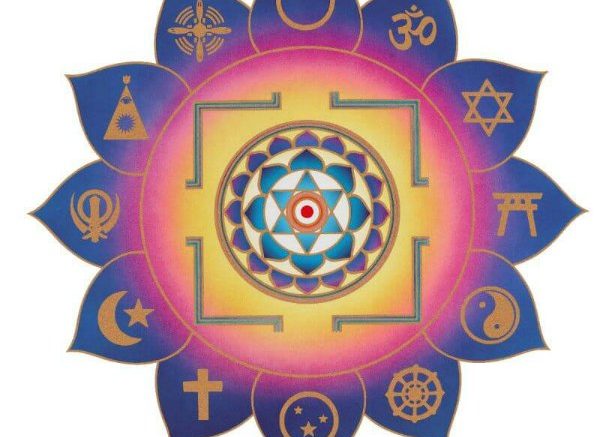Article 1 in a Series and also see indepth webinar by Dr. Mark Christian, called Beheading the Church here on American Pastors Network.
 by Dan Wolf (see full lnterfaith list here)
by Dan Wolf (see full lnterfaith list here)
This is the first in a series of articles examining a serious faith problem that is rapidly growing in Richmond and across our nation, the ‘inter-faith’ movement. The movement’s stated purpose is promoting dialogue across different religions; particularly Christianity, Judaism, and Islam. Jews and Christians share the Torah, or Bible Old Testament, a common bond that’s existed for almost 2,000 years. Neither of these religions share a similar bond with Islam.
However, the dialogue within these events is not open. It rests instead on a mutual trust based only on what a party (such as Islam) chooses to disclose about its religion – truth regarding religion is not defined by facts or understanding, but only by what one chooses to reveal about their religion. Others (such as non-Muslims) are to accept those disclosures as ‘truth.’ Truth becomes subjective instead of objective. It creates a type of impenetrable ignorance, shifting religion’s focus away from God and onto man’s stated beliefs regarding a religion, an understanding based solely on what a person chooses to reveal about their own religion.
One can only reflect upon their own religion according to ‘inter-faith’ principles. This insulates Islam from critical analysis while at the same time providing it the opportunity to dislocate others from their faith. These conditions serve the Muslim Brotherhood’s planned civilization jihad as defined in their documents collected during the Holy Land Foundation trial. Islam’s principle of sanctioned deceit and at times lies to further Islam’s advance allow it to manipulate ‘inter-faith’ discussions in accordance with its goals. Individual Islamic groups have been created to dialogue with students, Catholics, Protestants, and Jews.
The Richmond area “inter-faith” group recently held events at J. Sargeant Reynolds Community College and St. Bridget Catholic Church. (both videos below)Their stated purpose was to increase our community’s understanding of Islam. Presenters at both events expressed the conviction that a lack of knowledge about something different often leads to being fearful, and education is needed to overcome this fear. I agree with that sentiment; however, there is a difference between truth and misinformation.
This article and the next examine some ideas presented at these events, but more importantly addresses the notion held out that Islam is just another religion like Christianity and Judaism. We are going to present evidence from Islam itself that the half-truths presented at these events, and others like them, are simply false because they are incomplete. At times that information will be confirmed by various Christian sources, such as the Bible and early church father’s writings. This first article reviews some of the myths being presented as truth at these events. The second article studies three underlying issues regarding God, man, and their relationship from a Christian perspective.
It is likely that some will be angered by or reject these article’s contents, but all education must be grounded in truth, and all truth has God as its objective. God is truth. It is man’s truth which is false as it is often based upon deception. Unfortunately we live again in a time when it is man’s truth that we hear the most. We must be able to discern between the two types, examining the facts and making up our own minds. That is a true education.
Videos of the J. Sargeant Reynolds and St. Bridget Catholic Church (below) events can be seen through the Virginia Christian Alliance web-site. I hope you will read these articles, watch the videos, then make up your own mind.
What is the Muslim Students Association?
Before we begin, event presenters included Ghazala Hashmi and Lily Mirjahangiri (J. Sargeant Reynolds) and Dr. Imad Damaj (Virginia Commonwealth University). All are named as Muslim Students Association faculty advisors. In fact at the St. Bridget Catholic Church event, Dr. Damaj was one of the primary speakers. As many of you reading this probably know little about the Muslim Students Association, a brief history of their organization is in order.
The Muslim Brotherhood created an American chapter in 1962, and the Muslim Students Association was created in 1963 by them through the Muslim Student Union (also formed in 1962). Their objective was to create the Muslim Brotherhood’s brand of Islam within North America, specifically within the U.S. This organization has grown to the point where there are now more Muslim Students Association chapters on post-high school campuses than young Democrat and Republican chapters combined. Further, there are Muslim Students Association chapters forming within high schools – including Virginia. The Muslim Brotherhood has ties to a number of unindicted co-conspirators from the Holy Land Foundation trial that was halted in 2008. A diagram based upon documents from that trial detailing various Muslim Brotherhood relationships in 1991 can be found here. Those relationships have grown considerably since that time.
Myth: Islam Can Coexist With Other Religions
One of the Muslim Brotherhood’s most influential thought leaders was Sayyid Qutb. In his book Milestones he wrote the following in regards to inter-faith dialogue. The word Jahiliyyah refers to those in ‘ignorance of divine guidance.’[1] Qutb is refersing to all those who do not follow Islam.
Islam cannot accept any mixing with Jahiliyyah [the non-Islamic], either in its concept or in the modes of living which are derived from this concept. Either Islam will remain, or Jahiliyyah: Islam cannot accept or agree to a situation which is half-Islam and half-Jahiliyyah. In this respect Islam’s stand is very clear. It says that the truth is one and co-existence of the truth and falsehood is impossible. Command belongs to God, or otherwise to Jahiliyyah; God’s Shari’ah will prevail, or else people’s desires.[2]
Islam cannot coexist with other religions, in part because it is not simply a religion but an ideology with a religious component.
Searching for ‘Truth’?
Steve Cottam’s facebook page indicates he serves as youth minister at Our Lady of Lourdes Catholic Church in Richmond. At the St. Bridget event he indicated the inter-faith effort is a work of the church, and stated we are to seek truth, holiness, and peace. I agree. Engaging in religious dialogue should help us to grow in truth, but a dialogue requires that both sides ideas be presented and we must ourselves be grounded in the truth. The conversations should not be one-sided where the outcome has been pre-determined before a event even begins.
Mr. Cottam also stated that the ‘Church is not the sole proprietor of all types of truth.’ True enough, but in regards to God it is the sole proprietor of truth – at least if you are a Christian. Christ is the head of His church. Christ is God, and the Bible is God’s Word. Our outreach to others should be to present the case to them that God’s truth resides in the Bible alone and is epitomized by Christ’s teachings and actions.
Myth: Morality Shares the Same Place Within Both Christianity and Islam
Mr. Cottam indicated several similarities existed between Islam and Christianity. These included believing in one God, creation by that God, God speaking to us and caring for us, and Mary’s place as a holy woman deserving of praise and respect. However, the underlying basis for these shared ideas is very different. The truth will only be found if the truth is presented.
Mr. Cottam went on to say there are things other religions think about that while different do not contradict Catholic teachings, and those are things we should celebrate and learn from. I am all for learning the truth. Take morality for instance. Within Christianity God is the source of all morality, and we are each to be morally upright – righteous in our actions, speech, and decisions. If our actions fail to convey our beliefs, we are to use words in reaching out to others. We are each to live the truth.
Islam’s followers at these presentations place emphasis on morality within Islam. While morality is expressed within Islam, it was often not practiced by Muhammad. Instead expediency in the expansion of Islam was placed above all else, and all means which accomplish that goal are sanctioned by Islam. Obedience is all that is required.
This approach can be discerned in the Qur’an passage below. As Christians, we are called to help others out of love. It is our purpose and fulfillment of God’s divine law. Within Islam we are simply to help others because it is commanded. As with all forms of collectivism it is the ends alone which matter, and not the heart used to attain them.
A spring wherefrom the slaves of Allah drink, making it gush forth abundantly,
Because they perform the vow and fear a day whereof the evil is wide-spreading,
And they feed with food the needy wretch, the orphan and the prisoner, for love of Him,
(Saying): We feed you for the sake of Allah only. We wish for no reward nor thanks from you. (sura 76:6-9)
Myth: Good Works are Enough
Within Christianity, attaining heaven is not based upon anything we can do, but through believe in Christ alone as the Son of the ever living God – by God’s Grace. We do good works because we are transformed through our belief. Within Islam, one is called to do good works simply out of obedience. The same type of obedience that requires all to believe in Islam’s teachings, or at least submit to them.
Then, as for him whose scales are heavy (with good works), he will live a pleasant life. But as for him whose scales are light, the Bereft and Hungry One will be his mother (Hell). (sura 101.6-9)
It is not my wish to denigrate Islam’s followers as they are our brothers and sisters. We share a common kinship through Adam and a shared nature through our creation. But we simply do not share the same truth. Islam and Christianity are not only contrary but incompatible. It is therefore critical that there truly be a dialogue and not one-sided conversations.
The ‘Truth’ Presented
Myth: Diversity is Our Strength
One statement made at the beginning of the J. Sargeant Reynold’s presentation stood out. It was ‘with 100% confidence diversity is our strength.’ This is false. Our strength comes not from diversity, but instead from our ideas and faith. Those latter things should bind us together. They require unity and truth instead of a focus on unity alone so that we can be a single people with a single set of shared values, as we are called to be in 1 Peter 9-10.[3] We clearly do not have that today. However, each one of us possesses some form of faith, it simply comes down to whether that faith is in man or God, in what has been created or its Creator. To live without faith is an extremely difficult thing to do.
Myth: Man’s Nature Alone and Not Ideas
Information supporting two inter-faith positions were presented. Those interested in learning more about inter-faith notions can get a start here. First, the underlying issue is about Muslims, and not Islam. We simply do not understand Islam’s followers. Underlying this notion is the idea that we possess similar beliefs and ideologies. Second, American-Muslims are no different from anyone else. Islamic extremists do not reflect Islam. Another argument based upon our nature alone, and not on the ideas we each hold.
Regarding the first notion, this site has voiced from the beginning that the issue is not Muslims but Islam’s ideology. It is not about people, but ideas. We all share the same nature, and therefore share the same kinship. This is true. But if we divorce ideology from nature and take their notion based on our shared nature alone to its ultimate conclusion, then someone like Mother Teresa is no different from someone such as Joseph Stalin, Pol Pot, or Al Capone. I’m not sure many people would support that position. It is not only illogical, but is in fact absurd.
Myth: Islam’s Ideology Is Not Dangerous
Islam’s followers decide what they personally believe and live out as Islam, but Islam itself speaks loudly about its tenets and ideology—its world-view. Often these are not exactly the same. Some of Islam’s followers decide to recognize and live only certain subsets or aspects of its belief system. However, Islam is by its very nature political, it calls it followers to an extreme reordering of their life and priorities. This disparity is one reason why Islam’s ideology is dangerous. Each person every day makes a decision as to what they embrace from Islam. Each generation as it reaches maturity decides for itself what is Islam. Islam changes over time and absorbs ideas it encounters from other cultures that are beneficial to it. This tendency was noted by Ignaz Goldziher a century ago.
He indicated this change was associated, at least in part, with the rise of the Abbasid Dynasty in the eighth century. Islam’s position comes from believing that a collective consensus protects its community from error.
We shall have occasion to study more closely the application of this principle as a criterion of orthodoxy. We shall see that only the continued effectiveness of this principle, throughout the history of Islam, explains that certain religious phenomena gained the stamp of orthodoxy because they had gained general acceptance, although in theory they should have been ensured as being contrary to Islam.[4]
Myth: Religion Within Islam Is Separate from the Rest of Society
Society’s religious, political, governance, civics, culture, military aspects all come under Islam’s embrace. All is Islam. If you do not believe that, then I suggest you review a copy of a text on Islamic law such as Reliance of the Traveller[5] which was written in the fourteenth century and is widely used today.
Myth: Freedom’s Nature Is the Same Within Islam and Christianity
A short film was presented at the J. Sargeant Reynold’s event entitled American Muslims: Facts vs. Fiction. It was full of half-truths. Some of the assertions made in this film will be consolidated with those made at the St. Bridget event as there is considerable overlap. We can start with the freedom to choose Islam. If your father follows Islam, you are born a Muslim. Period. It is a cradle to grave belief system. Within Christianity, you have the capacity to choose from all things, while within Islam you have the capacity to choose only from one thing – Islam.
A non-believer can choose to accept Islam at any time, but leaving is generally more difficult and is not openly done in countries that are Islamic as the price is likely death. This is very different from Christianity where one makes a conscious decision to embrace its beliefs which include; who God is, the relationship between God the Son and God the Father, and accepting God’s lordship over our lives. The Islamic profession of faith is simply there is no God but Allah, and Muhammad is his prophet. Simple acceptance and obedience, an entrance with no exit.
Myth: Man Has the Same Purpose Within Islam and Christianity
Within Christianity we have each been given the freedom to choose whether we fulfill our purpose, to become good as God is good – to the best of our ability. Completing this purpose requires a personal relationship with God. We were specifically designed for that purpose through God’s image that He gave us during creation. It is an inward image. This relationship is achieved through study, prayer, reflection, and the choices we make. However, Allah is inscrutable – unknowable. He cannot be known by man as he is pure will, without any being, nature or essence. Instead man is created as a slave with the single purpose to worship Allah. But how can one worship what they cannot know? This is a profound difference as our purpose within Christianity is not possible to achieve within Islam.
Myth: Muhammad’s Actions in Medina Were Charitable
The J. Sargeant Reynold’s film states Muhammad’s first actions in Medina were to feed the hungry, spread peace, pray at night, and commit to family. These are all charitable actions. They require love. However, the film fails to mention the Medina Constitution that he also wrote shortly after migrating from Mecca. This document drew distinctions between believers and non-believers, that believers were not to support non-believers against other believers. It was the first step toward the dhimmitude (second class status) that exists in the Middle East today for all non-Muslims. Instead dhimmis (non-Muslims subject to Islamic law) are the state’s property to be managed for the benefit of the community of Islam’s believers (known as the umma).
This agreement was forced upon the Jewish tribes initially living in Medina, even though they did not agree to it. This film also fails to mention the differences between Islamic and other charities. Most Christian charities simply give to those in need. However, Islamic charities are to expend funds only for Islam’s followers in certain areas including; (1) payment for the collection of monies for charity, (2) supporting travelers (particularly those on the pilgrimage to Mecca), (3) those in need (the poor), (4) to relieve Muslims from debt, and (5) the spreading of Islam—jihad, whether by peaceful means or conflict. This last item is why the West considers Hezbollah a terrorist organization, but within the Islamic world it is considered a charity. Same word, but an entirely different meaning. In discussing Islam, we must not only look at the words being used, but understand their meaning.
Myth: Islam Is Tolerant of Other Religions
The assertion was made that Islam as a religion is not more likely to lead one to violence. This position is usually supported by citing several verses from the Qur’an, such as sura 109.6 which says Unto you your religion, and unto me my religion, or Sura 2.256 that says There is no compulsion in religion. What Islamists usually fail to mention is that both the above verses have been abrogated (replaced) by sura 9.5. This verse says, Then, when the sacred months have passed, slay the idolaters [unbelievers] wherever ye find them, and take them (captive), and besiege them, and prepare for them each ambush. But if they repent and establish worship and pay the poor-due, then leave their way free. These passages are all from Pickthall’s translation of the meaning of the Qur’an.[6] Pickthall was an early twentieth century British convert to Islam and his translation has been reviewed and edited by Egyptian clerics. It is generally accepted as being an accurate literal translation of the Qur’an’s meaning.
Myth: Islam Fights Only to Defend Itself
Dr. Damaj asserted that fighting by Islam is required only in defending oneself. He failed to mention that in Islam’s first 100 years it defended itself all the way from the Arabian Peninsula into southern France in the west and as far east as modern Pakistan and India. In those one hundred years it conquered as much territory as was held by the Roman Empire at the height of its power – only it took Rome four or five centuries to accumulate that much land. He also failed to mention that it happened again under the Ottoman Empire where two battles were fought at the gates of Vienna as late as the seventeenth century. His statements in this regard are simply intellectually dishonest, but acceptable in our society today if you hold the ‘right values.’ They are also sanctioned within Islam. A concept called taqiyya which allows the use of deception or deceit in order to achieve the greater goal of furthering Islam. Again, a placing of expediency over morality.
Myth: American-Muslim Views Reflect Islam In the Rest of the World
The film presented at J. Sargeant Reynold’s focused on American-Muslim beliefs, but do those beliefs reflect those of the other 1.6 billion Muslims in the world today? First, they cite that most of this group believes other faiths also lead to salvation, but survey information from the Pew Research Center indicates that most of Islam’s followers outside the U.S. believe that Islam alone leads to salvation – about 1.3 billion out of 1.6 (for more information a series on global Islamic attitudes begins here). Second, the film stated survey results of American-Muslims supported the position that most followers of Islam condemn attacks on civilians. From the same Pew Research surveys noted above, about 500 million of its 1.6 billion followers view Hezbollah and Hamas favorably, and about 250 million believe that suicide bombings are often/sometimes justified.
Myth: Islam is a Religion of Peace
This same film stated that more Muslims are killed today by extremists than non-Muslims, and ask why Muslims are considered to be perpetrators and not victims. Estimates put the non-Islamic death toll from the spread of Islam at as many as 280 million since the seventh century. These figures include Christians, Jews, Zoroastrians, Nestorians, Buddhists, Hindus, gnostics, and pagans, and averages about 200,000 per year for almost 1,400 years. The number of Christian deaths alone at the hands of Islam over the last decade has varied between 35,000 to over 100,000 per year. The film is correct that the figures just mentioned do not contain the death toll of Muslims in the spread of Islam including Sunni, Shia, Mamluks, Fatimid, Druze, Alawhite, Safavid, Ottoman and many others. Muslims too are victims, but are they victims of extremists or victims of Islam’s very tenets?
This comes down to the meaning of the word peace. Augustine wrote that man does not wage peace to make war, but rather wages war to make peace – a peace that is more to his own choosing. War ensues when man turns away from God. When man turns toward himself he ceases to obey God’s law to love Him and his fellow man – His creation. Within Christianity peace is to be man’s normal state as he is turned toward God. Within Islam, conflict is the normal state and peace the interlude between conflict. It occurs with submission after conflict. This difference has its roots in culture and the Arabian Peninsula’s environment.[7]
Myth: Women Have Equality Within Islam
The women in the video and the J. Sargeant Reynold’s panel said that the restrictions we hear about women within Islam did not apply to them. Easy to say in the U.S. In places like Saudi Arabia, they would be required to wear traditional dress, not be allowed out of their house without a male family escort, unable to drive, their statements in court would only have half the weight of a man’s testimony, and they could be forced to marry as a child if their father wished, etc. Many Muslims in the U.S. have left behind the more restrictive cultures existing within their Islamic homelands, or are descendants of those who left.
Women within Islam are property. They are owned by a male, either someone in their family or their husband. Al-Ghazali, one of Islam’s most prominent clerics, wrote the following concerning marriage in the eleventh century.
Marriage is a form of slavery. The woman is man’s slave, and her duty therefore is absolute obedience to the husband in all that he asks of her person. A woman, who at the moment of death enjoys the full approval of her husband, will find her place in paradise.[8]
Where is the feminist outrage at such a position at these events. I forgot. They are focused on the ‘white male domination of Christianity’ that is the reason why we are fearful of Muslims. It has nothing to do with the ideas just mentioned. Such a delusion leads to being the kind of useful idiot that Lenin referred to during the Russian revolution. We are each free to make our own choices, but we are also accountable for them. Therefore those choices should be made in the full light of truth.
Myth: Extremists Constitute About 1% of Islam’s Followers
The media and Obama administration reported extremists make up only about 1% of the world’s 1.6 billion Islamic population. If true, the total number of Islamic extremists world-wide would be about 16 million people. The Islamic population within the U.S. today is estimated at about 7 million, about .5% of the world’s total Islamic population. Based upon the differences noted above between American-Muslim attitudes and those in the rest of the world, maybe that 1% of Islamic extremists are not those living outside of the U.S., but instead those currently living within it.
Dan Wolf is a researcher, analyst, and author. He has written three books examining the relationship between faith, freedom, virtue, and charity. Together these form the cornerstone of our purpose, and our society’s foundational principles derived from those relationships. Links to his work can be found at the Living Rightly website.
[1] Qutb, Sayyid, Milestones, p. 3, SIME ePublishing, 2005
[2] Ibid, p. 89.
[3] ‘But you are a chosen race, a royal priesthood, a holy nation, a people for God’s own possession, so that you may proclaim the excellencies of Him who has called you out of darkness into His marvelous light, for you once were not a people, but now you are the people of God; you had not received mercy, but now you have received mercy.’
[4] Goldziher, Ignaz, Introduction to Islamic Theology and Law, p. 51, Princeton University Press, 1981.
[5] al-Misri, Ahmad ibn Naqib, Reliance of the Traveller: A Classic Manual of Islamic Sacred Law, amana publishing. Copies are available in many bookstores or on-line at sites such as http://www.actmemphis.org/Reliance-of-the-Traveller2_complete.pdf.
[6] Pickthall, M.M., The Meaning of the Glorious Qur’an, amana publishing, 1999.
[7] Wolf, Dan, A War for God, pp. 28-9, living rightly publications, 2017.
[8] As cited in Darwish, Nonie, Cruel and Usual Punishment, p.40, Thomas Nelson, 2008.





